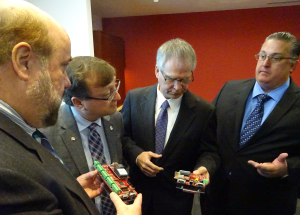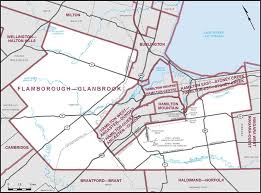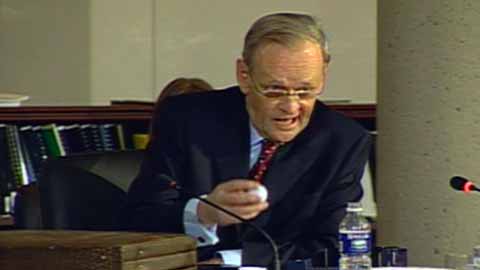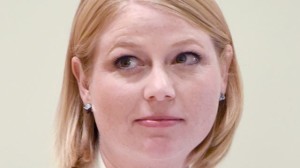September 28, 2015
BURLINGTON, ON
Ray Rivers has been writing a column on political issues in the province and across the country. The Gazette asked Rivers to drop his regular column and write instead on what took place during the week. This is his third column on the federal election and what has transpired to date.
Since the beginning of this election campaign the NDP have held the lead. This is the first week that polls show their numbers dropping and the party falling into third place. Support for the once-socialist entity seems to be vaporizing across the entire country, including in Quebec. But never say never in an election this close.
In contrast, the Harper Conservatives have picked up steam mid-campaign, making it seem like a Tory minority is in the works, come Oct 19th. And the polls may actually be underestimating the number of seats Mr. Harper will ultimately win.

Burlington MPP Mike Wallace, second from the left, taking part in the handing out of federal funds to Burlington industry.
For one thing he has more money than the other parties combined, and given the extended election period will assail the other party leaders with a ton of attack ads, which we know work. Then, there is this orgy of recent spending for pre-election goodies in Tory ridings, to showcase, promote and help profile Tory candidates.
Further, Mr. Harper’s government has changed the electoral map to his advantage. With 30 new seats in Parliament it is expected that the Conservatives could win 22 of them, based on the results of the last election. It’s called the ‘gerrymandering’, what his party’s Republican cousins south of the border have perfected, configuring the geography of ridings so the demographics favour the election of Tory candidates.
For example, my riding of Flamborough-Glanbrook was configured by segregating the rural areas from Tory-hostile urban Hamilton. Since rural folks are typically expected to favour Conservatives candidates, the strategy is for the ‘big blue team’ to hold at least one seat in red/orange Hamilton. The riding configuration makes no sense otherwise. It would take longer to drive from one end of the new riding to the other than a trip to downtown Toronto in rush hour.

The Flamborough – Glanbrook constituenmcy is a classic example of “gerrymandering” – a form of boundary setting that has little to do with the voters as a community – more to do with putting like minded voters in the same riding to ensure a win for the governing party.
Holding the most seats in the House, and unlikely to improve on that, Mr. Harper’s strategy is strictly defensive. So, in an effort to discourage voters who aren’t likely to vote Tory, the government enacted its “Fair Elections Act”. Another idea borrowed from southern Republicans, this legislation sees election rules and responsibilities altered so as to restrict the ability of marginal voters to cast a ballot. And it sure looks like some kind of revenge, that Elections Canada’s powers to police cheating have been curbed.
Speaking of cheating, recall that in 2006 Mr. Harper’s back-room boys broke the election financing rules, enabling them to illegally move money around to expand their campaign. The Conservative party ultimately pleaded guilty to exceeding election spending limits and submitting fraudulent election records, and agreed to repay $230,198.00 for its role in violating Canadian election spending laws.
In the 2011 election a Conservative Party staffer blitzed over 6000 non-conservative voters in Guelph with robocall mis-information in an attempt to keep them from casting ballots. It is thought that as many as 200 voters went to the wrong polling places as a result. There were over 800 complaints to Canada’s election commission over this, and seven ridings sought to have their results overturned.
It’s not that the other parties are always squeaky clean. The NDP recently tried to use public money to mail political flyers. More recently, a provincial Liberal campaign worker was charged by police in connection with last February’s by-election in Sudbury.

Former Prime Minister Jean Chretien using a golf ball to make a point during an inquiry into federal spending – several senior bureaucrats went to jail for that one. It was not one of Chretien’s finest hours – and Burlington’s Paddy Torsney lost her federal seat over that issue.
And then there was the Liberal ‘Sponsorship’ scandal, the consequence of which has seen the federal party lose its place in Quebec politics for the last decade. No other scandal in modern Canadian history has resulted in this kind of rebuff. By comparison, robocalls, a flagrant attempt to prevent voters from casting their ballot, has apparently been forgotten/forgiven.
I watched this week’s debate, in French, since the English language version was virtually unintelligent – with the leaders and moderators talking over each other in both official languages. Mr. Harper joined the Bloc in playing to Quebec’s social conservative base in discussing the Niqab ban, and both parties rose in the polls as a result. Quebecers, and most Canadians apparently agree with the PM on this issue.
Mr. Harper’s self-defence strategy has him feeding his party’s base, hoping to give them enough religion that they will return the faith – showing up on Election Day. To that end he has now added another unenforceable economic policy with the ridiculous name of ‘tax lock’. He is promising no federal tax increases of any kind for the next four years if he wins. This is the second silly shoe, given he’s already passed a balanced budget law – which most experts believe will be broken come year end.
And finally this week, it seems that at least one Hamilton area NDP candidate has reduced her chances of winning over the voters. Alex Johnstone, when

Hamilton Ontario, Sept 22, 2015 Alex Jonstone NDP candidate for Westdale, Dundas, Ancaster at debate Tuesday night in Dundas. Cathie Coward / Hamilton Spectator
confronted with an improper remark about Auschwitz she’d made years ago on social media, apologized by claiming she didn’t know it was a concentration camp. I guess this school board official must have skipped that class in candidate college.
 Ray Rivers writes weekly on both federal and provincial politics, applying his more than 25 years as a federal bureaucrat to his thinking. Rivers was a candidate for provincial office in Burlington where he ran as a Liberal against Cam Jackson in 1995, the year Mike Harris and the Common Sense Revolution swept the province. Rivers is no longer active with any political party.
Ray Rivers writes weekly on both federal and provincial politics, applying his more than 25 years as a federal bureaucrat to his thinking. Rivers was a candidate for provincial office in Burlington where he ran as a Liberal against Cam Jackson in 1995, the year Mike Harris and the Common Sense Revolution swept the province. Rivers is no longer active with any political party.
Background links:
Seat Projections Redistribution Rural Votes Gerrymandering USA
Fair Elections Act In and Out Scandal
















Trump has promised to make the Mexicans pay for the new wall at the US border. Harper’s cronies in the Republican Party have been demanding a similar disgrace to Canada at the 49th parallel. Is this a time when Harper’s superpower skill of just running away and hiding in a closet could be his greatest asset? In this case, the True North, after the election, may not be so strong and not so free.
I know the federal election is top of mind but all you had to do is use your provincial Liberals as a perfect example for the topic of your article. Gas plants, Sudbury etc. They are really good at “cheating”